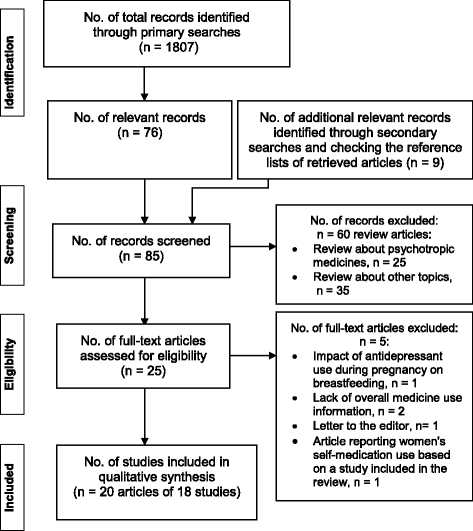Postpartum women's use of medicines and breastfeeding practices: a systematic review
- PMID: 26516340
- PMCID: PMC4625926
- DOI: 10.1186/s13006-015-0053-6
Postpartum women's use of medicines and breastfeeding practices: a systematic review
Abstract
The objectives of this article are to systematically review i) the extent of medicine use in postpartum women, and ii) the impact of maternal medicine use (excluding contraceptives and galactogogues) on breastfeeding outcomes (initiation and/or duration). PubMed, Medline (Ovid), Scopus (Elsevier), Cinahl (EBSCO), PsycINFO (Ovid), Embase (Ovid) and Web of Science (ISI) databases were searched to find original studies on medicine use in women after the birth. Additional studies were identified by searching Google Scholar, Wiley Online Library, Springer Link, selected journals and from the reference list of retrieved articles. Observational studies with information about postpartum women's use of any type of medicine either for chronic or acute illnesses with or without breastfeeding information were included. The majority of relevant studies suggest that more than 50 % of postpartum women (breastfeeding or not) required at least one medicine. Due to the lack of uniform medication use reporting system and differences in study designs, settings and samples, the proportion of medicine use by postpartum women varies widely, from 34 to 100 %. Regarding the impact of postpartum women's medicine use on breastfeeding, a few studies suggest that women's use of certain medicines (e.g. antiepileptics, propylthiouracil, antibiotics) during lactation can reduce initiation and/ or duration of breastfeeding. These studies are limited by small sample size, and with one exception, all were conducted in Canada more than a decade ago. Large scale studies are required to establish the relationship between maternal medicine use and breastfeeding, considering type of illness, period of use and total duration of medicine use.
Keywords: Breastfeeding; Lactation; Maternal; Medication; Medicine; Postpartum.
Figures
References
-
- Declercq E, Sakala C, Corry M, Applebaum S. New mothers speak out: national survey results highlight women’s postpartum experiences. New York: Childbirth Connection; 2008.
Publication types
LinkOut - more resources
Full Text Sources
Other Literature Sources
Medical


